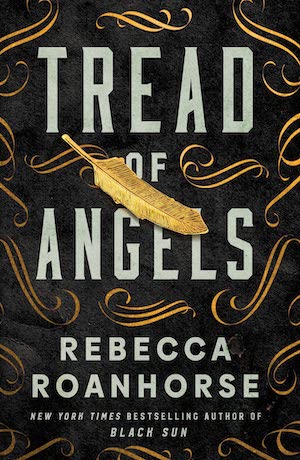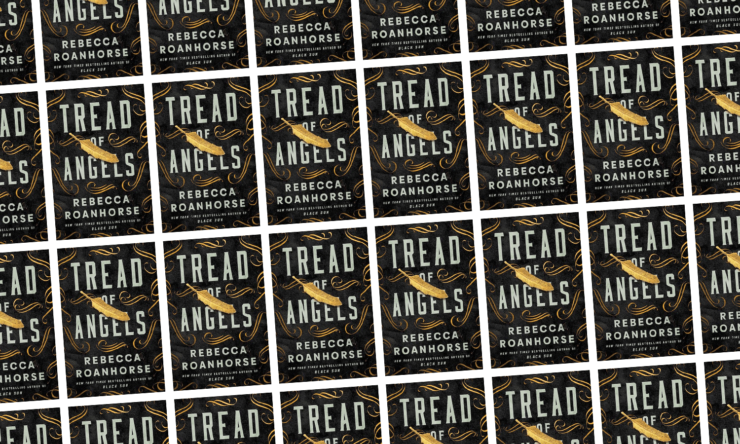Rebecca Roanhorse is deeply skilled at balancing fresh, intricate worldbuilding with nuanced and compelling characters, and her talents are thoroughly on display in Tread of Angels. This historical fantasy packs subversive inter-genre work into a taut, efficient novella.
The year is 1883. The setting, the town of Goetia, nestled within the mountains of Colorado at the height of a fevered mining rush. The element is divinity itself, all that remains of the rebel Abaddon after those who call themselves the Elect triumphed in Heaven’s War. Divinity powers a burgeoning industrial revolution, marking the distinction between past and future, the old ways and the world built on its bones. Every self-righteous Elect wants that power—but only the Fallen, those descended from the rebels, are capable of seeing it. The Fallen are also immune to Abaddon’s Revenge, the insanity that grips the Elect from too much exposure to mining divinity. Goetia exists at the knot of this tension, Elects exploiting Fallen workers with their upper-class influence and barely concealed distaste, while the sustenance of their own fortunes are dependent on Fallen hands.
Buy the Book


Tread of Angels
Mixed sisters Celeste and Mariel led very different lives. They have the same blood, but Celeste passes enough that she grew up with their Elect father and all the privileges the status affords. Mariel is undeniably Fallen. So when Mariel is accused of murder—murdering a Virtue, no less, the highest rank of the Elect, humans sworn to the Order of Archangels—Celeste knows she’s her sister’s only hope of salvation. With the privilege afforded by her Elect blood and the heart of the Fallen lineage she shares with her sister, Celeste plunges headfirst into the intricacies of the courts to prove Mariel’s innocence. But the more Celeste uncovers, the more powerful enemies she makes, and startling discoveries threaten everything she’s ever known, and her very soul itself.
Tread of Angels is an incisive, subversive twist on both the Western and the fantasy of divinity. It twines all the atmosphere and debauchery of the Western genre with a keen eye on its inextricable context of American imperialism and the violence inherent in romanticizing the American “Old West.” Roanhorse’s dark fantasy seamlessly blends the texture of a Western into her interpretation of the mythology of Fallen angels, and transposes it into a very grounded narrative of what it means to pass. Roanhorse is the perfect writer to execute this premise with sensitivity and her unique brand of magic. The resulting novella is a satisfying snapshot into an epic, mythic and intimate at once.
At its core this is a story about sisterhood. The intricacies of mixed identity within the same family, of the responsibilities that come with passing. In her acknowledgments, Roanhorse cites the desire to “upend the tragic mulatto,” and she does it expertly here. She explores the limits of self-identification, which feels fiercely familiar to me, as a mixed-race person who undeniably benefits from white privilege despite my blood, my heart, my family. It’s a firm, unapologetic excavation of what we actually owe, versus the counterproductive, selfish intrusions borne out of the useless guilt of privilege. There’s heat in this writing, in the externalization of that guilt, the balance of duty and condescension, the festering resentment. Celeste needs to be honest with herself and the realities of how she experiences the world. She’s Fallen by blood, but her life has never and will never be shaped by the injustices that the fully Fallen and the mixed who can’t pass must endure. Her assumptions about her sister cloud Celeste’s perception so thoroughly she can’t even see the truth of the woman in front of her, the truth of who, exactly, might need to be saved.
This all makes Celeste an extremely effective unreliable narrator. Her quest brings her to Abraxas, her demon ex-lover, and through him we learn a great deal about what Celeste has given up to protect her sister. Somewhere between sacrifice and self-serving lies a compelling descent into something almost anti-hero. That descent is paved with temptation, desire, and the twisted echoes of once-righteous recollection. Tread of Angels starts off feeling like it’s about one thing but it’s actually mostly about another, the bloody cross-section of a deeper wound.
Intense and fast-paced, Tread of Angels is an elegant genre pastiche and a sharp exploration of the tenuous line between divinity and monstrosity. This is one of the freshest historical fantasies I’ve ever consumed, an innovative and clever risk of a premise with a payoff richer than the Goetia mines on a good day. For readers new to Roanhorse’s work, this adroit novella’s quick page count makes it an ideal bite to sample her masterful writing before you venture into devouring her series novels, which I also deeply adore. For returning fans, expect something wholly different in the shape of her fantasy, but one that cuts true to Roanhorse’s incisive worldbuilding, lush writing, and messy, complex characters you can’t help but root for.
Tread of Angels is self-contained and satisfying, but I certainly would pick up another novella in Roanhorse’s Goetia. I am not typically a fan of quietly devastating endings, but this one rang perfect, fraught, and true.
Tread of Angels is published by Gallery / Saga Press
Maya Gittelman is a queer Fil-Am and Jewish writer and poet. They have a short story forthcoming in the YA anthology Night of the Living Queers (Wednesday Books, 2023). She works in independent publishing, and is currently at work on a novel. Find them on Twitter (@mayagittelman) or Instagram (@bookshelfbymaya).










